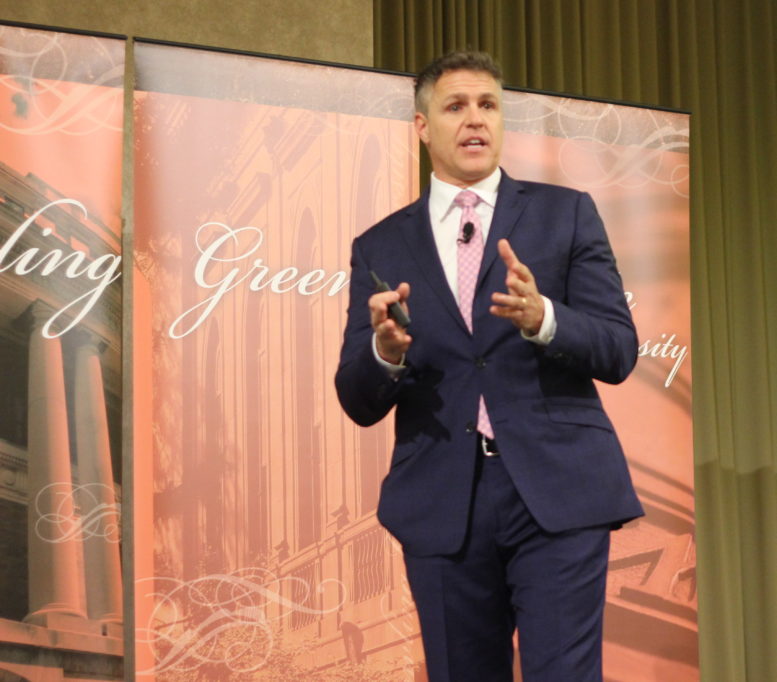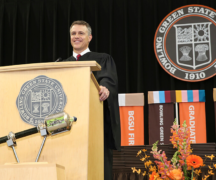By DAVID DUPONT
BG Independent News
The first image Jay Crawford flashed on the student union ballroom screen Tuesday night was one of him on his graduation day in 1987.
Here he was in all his 22-year-old finery, gold necklace visible because his shirt collar was unbuttoned, and long locks hanging underneath his mortar board.
The image was a fitting introuction to his talk “You Can Get There from Here,” in which he talked about his journey from Bowling Green State University to a tiny TV station in Hazard, Kentucky, and over 30 years all the way to ESPN’s flagship show SportsCenter. That “really groovy picture of me,” he said, caught him on the first step of his journey.
In the talk the Sandusky native offered advice and encouragement to students about how to pursue a career.
That photo also introduced an important undercurrent to Crawford’s success story. He was flanked by his parents.
“The people on left and right had an undying faith and belief in me,” he said. They worked hard to put him through college debt-free. “It was my job to never let them down,” Crawford said. “I want my parents to be proud of me. I want them to understand I appreciate the sacrifices they made for me.”
Crawford is spending this academic year as an executive in residence in the School of Media and Communications. In April as part of a cost cutting move, ESPN bought out his contract. The terms of his separation agreement with ESPN will keep him from taking another media job until late 2019. This period is his “practice retirement,” he said.
Introducing Crawford, Tariel Turner, an undergraduate student, said has been impressed by Crawford’s “ability to listen, and not just listen, to understand and to affirm.”
The qualities that allowed him to ascend through sports broadcasting are rooted in the qualities he learned from his family, particularly grit and work ethic. “Work ethic is a choice,” he said. “If you choose to be the first in and the last out and work harder than all your colleagues, you’ll be rewarded. People from this part of the country have it.”
With family members sitting in the front row, he talked about his uncle who was a farmer. No one, he said, worked harder or longer.
His Auntie Annie raised four kids by herself. The children went on to get master’s degrees. And after having to quit high school to help support her family, she received her high school diploma at 95.
“That’s where I come from,” he said. These folks raised children and grandchildren and “put them through college and stressed the importance of education.”
Even before Crawford graduated he put in long hours at BGRSO while his classmates were at the Brathaus.
His first job was in Hazard, Kentucky. He was a one-man sports operation. He reported and edited his own film, working 60-70 hours a week for $15,000.
This kind of job, he said, benefits someone just out of college. “The more you can do, the more valuable you are to your company.”
After three years, he moved to Hartford, Connecticut, covering his first professional sports team, the Hartford Whalers. When his two children were born to him and his wife and Falcon Flame, Tracy, he took a job back in Columbus to be closer to family. “I wanted them to experience what I did.”
But five years later, a position in Tampa, Florida opened up. “Sometimes the pull for advancement is so strong, it overwhelms your sense of family and home.”
Then after five years in Tampa, including covering the Tampa Bay Buccaneers winning a Super Bowl, ESPN came calling. They were starting a new morning show, “Cold Pizza,” aimed at college students, who they said ate cold pizza in the morning. They wanted Crawford to host it. Crawford thought it was “a dumb idea.”
“I want nothing to do with it,” he told them. His kids were settled into middle school, and he didn’t want to disrupt them.
ESPN persisted. So he uprooted his family to move to New Jersey, just outside of New York City. The show and Crawford were hits. The network decided it needed to broadcast in high definition. That meant relocating to Bristol, Connecticut.
Crawford drew the line. The children were now in high school, and he would not move them. ESPN ended up hiring a car and driver to drive him the 101 miles from his New Jersey home to the studio and back every day.
“That’s really the biggest single challenge, managing the responsibilities of father and husband in a career that’s very demanding (in terms of) time and travel.”
He missed experiencing things with his kids, “the joy of my life,” because he was off covering the World Series.
“I missed my son’s first home run,” he said. His son was 11, and earlier in the season he had just missed a home run. He said the next time they played on that field, he was going to hit one out. That time came while Crawford was off covering the Indianapolis 500. Crawford knew where his son was playing and anticipated what he would hear when he answered his phone.
His son had hit the home run. Crawford said he felt a void. “I was empty for 24 hours.”
Yes, he said, “I was providing a very comfortable life for family but along with that goes great sacrifices.”
Then comfortable in his career, he said, “I started telling people ‘no.’ … I made far fewer sacrifices after 2008.”
His son, Corey, blossomed into an outstanding track and field athlete at Rutgers University. When he won the NCAA championship, Crawford was there. The staff at ESPN knew the schedules of all the top collegiate meets, and knew that’s where Crawford would be.
His children carry on those family traits that served their father so well.
His son, a sprinter and long jumper, is preparing to compete for a spot on the 2020 U.S. Olympic team. As proud as he is of his son’s accomplishments, Crawford is more proud that his coaches consider him the hardest working athlete they know.
And his daughter Kirstyn is now a producer for George Stephanopoulos. She got the job right out of Columbia University. Though Stephanopoulos works for ABC, part of the Disney corporate family that also owns ESPN, she never told her father she was applying for the position. He only learned later, and asked why she didn’t ask for his help. She wanted to do it on her own, she said.
She started as an assistant producer, and when the producer left after a couple years, Stephanopoulos insisted she take over.
“That’s,” Crawford said, “my daughter.”
No he’s enjoying taking it easy during his “practice retirement.” He expects wen 2020 rolls around he’ll venture back into the business. But he doesn’t expect it’ll be with ESPN.
‘I don’t know what’s next after my practice retirement,” It’s the kind of uncertainty the students he meets at BGSU experience. His advice to them and to himself is: “Embrace it.”





